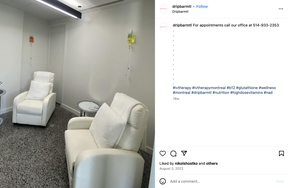Be wary of IV vitamin therapy, Quebec health-care orders say

Influencers promote the treatment for things like fatigue, low energy and even hangovers, despite there being no scientific evidence to back it.

Article content
Four orders of health professionals in Quebec are warning both their members and the population to be wary of the growing trend of intravenous vitamin therapy promoted by social-media influencers.
Administering vitamins through the bloodstream is normally done in extremely specific cases, for patients who have been evaluated by doctors and are deemed in need of the treatment, the orders say. But influencers in Quebec and beyond have been promoting IV vitamin therapy as a sort of cure-all treatment to help with things like fatigue, low energy and even hangovers, despite there being no scientific evidence to back it.
Advertisement 2
Article content
Article content
“As of right now, the scientific body of evidence doesn’t show that giving a vitamin to someone who doesn’t have a vitamin deficiency is helpful,” said Joëlle Emond, president of the Ordre des diététistes-nutritionnistes du Québec. “But we do know that there is a risk, and the risk could be as bad as being lethal.”
The risk associated to IV vitamin therapy is infection, given the fact that the liquid is injected directly into the veins, unlike oral vitamins. Since there’s no proof to back up the efficacy of the treatment, Emond says it’s just not worth the risk.
Luc Mathieu, president of the Ordre des infirmières et infirmiers du Québec, said he’s aware of roughly 20 private clinics in the Montreal area that provide the service.
“There’s a craze for it, especially in the middle of winter,” he said. “Sometimes, when February arrives, it might be the shortest month, but some people feel like it’s long because they feel depressed, they feel tired and they need a little energy boost, so they think that this approach will do the trick.”
Based on some of their Instagram profiles, the clinics appear to offer different options depending on a patient’s symptoms.
Article content
Advertisement 3
Article content

Emond said she has noticed that in the United States, IV vitamin therapy is being administered in places like hotel rooms, casinos and shopping malls.
A few years ago, influencer-models Kendall Jenner and Hailey Bieber got treatments on an episode of the reality show The Kardashians.
“We’re on our way to see some friends and we’re just going to get some nice IV bags,” Jenner said. “It’s what we consider a really fun day.”
In an effort to be proactive as the trend grows in the province, Emond and Mathieu’s orders joined the orders of pharmacists and physicians to issue a joint letter reminding their members of their ethical obligations as health professionals — which include making sure treatments they administer are backed by evidence.
“The four orders are making a severe clinical judgment saying that all the allegations — the whole miracle side of these therapies — are not based on science,” said Jean-François Desgagné, president of the Ordre des pharmaciens du Québec. “In the best of cases, people will have spent several tens or hundreds of dollars for a treatment that, at the end of the day, will bring them little or nothing. And in the worst of cases, people (jeopardize their health) with risks of infections.”
Advertisement 4
Article content

On Tuesday, a South Shore clinic that had been offering the treatments announced it was suspending them in response to the notice issued by the orders.
“We have always favoured a rigorously safe and meticulously applied protocol,” iCRYO Brossard said in a statement posted on Instagram.
The clinic appears to have removed all posts showing the treatment from its page.
Recommended from Editorial
-

The Right Chemistry: Homeopathy is scientifically implausible
-

Opinion: Intravenous vitamin therapy is useless for almost everyone
For Desgagné, one of the biggest concerns surrounding the therapy is it’s unclear where the product is coming from. In the notice, the orders note vitamin and mineral infusions don’t have drug identification numbers issued by Health Canada, and that it’s up to the professional who administers the product to obtain information about the manufacturing process, content and quality.
“Who prepares the product? Where do they procure these products?” Desgagné said. “In my pharmacy, I can trace all the items, the procurement … with no problem. I’m not sure if we can do as much with these products that are injected into patients.”
Emond, Mathieu and Desgagné all expressed concern about other so-called health trends sweeping across social media nowadays, many of which do not involve consultations with health professionals.
“It’s a trend that’s present and I can tell you it makes us very uncomfortable and that we’re following it very closely,” Desgagné said.
This story was highlighted in our One Read newsletter. To subscribe, visit montrealgazette.com/newsletters.
Advertisement 5
Article content
Article content
link



